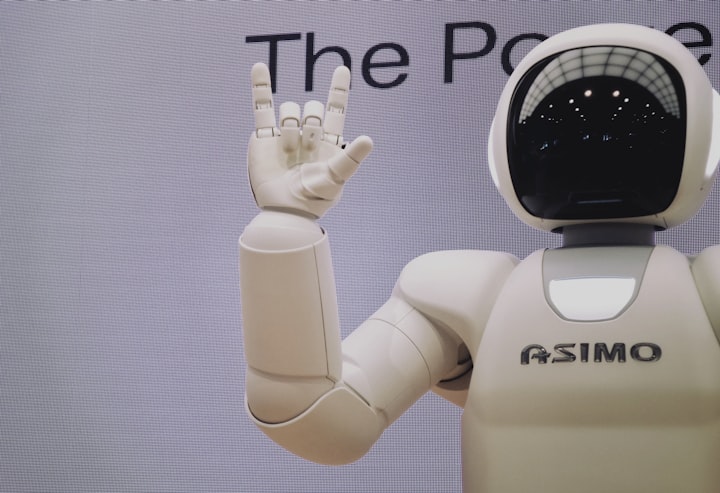"Unleashing the Power of Artificial Intelligence: How AI is Revolutionizing Industries and Ushering in a New Era of Innovation
"The Rise of Artificial Intelligence: Innovation, Transformation, and the Future of Society"

Artificial Intelligence (AI) is transforming the world, and it is about to grow the economy in ways we could have never imagined. In the coming years, AI will revolutionize the way we work, live, and think. From healthcare to manufacturing, finance to retail, AI is set to disrupt every industry, creating immense opportunities for growth and prosperity.
The potential for AI to grow the economy is immense. For starters, AI can automate many repetitive tasks, freeing up human workers to focus on more complex and creative tasks. By doing so, it can lead to increased productivity, higher efficiency, and lower costs – key ingredients for economic growth. For example, consider the case of the finance sector. Investment banks, financial institutions, and hedge funds can use AI algorithms to analyze vast amounts of data in real-time. This can improve their decision-making processes, detect frauds, and reduce operational inefficiencies. Similar advancements are taking place in healthcare, where AI could help physicians diagnose diseases and develop personalized treatment plans.
But the benefits of AI extend beyond automation and efficiency. AI can lead to new forms of innovation, creating entirely new industries, products, and services. The key to unlocking AI's full potential is to combine it with other cutting-edge technologies like the Internet of Things (IoT), blockchain, and big data analytics. For example, an AI-powered IoT system could revolutionize manufacturing by optimizing product designs, reducing costs, and improving quality control. Similarly, blockchain-based AI systems can facilitate secure and efficient data sharing, boosting innovation in fields such as drug development, logistics, and supply chain management.
AI can also help address some of the pressing challenges facing society today, such as climate change and social inequality. For example, energy companies can use AI algorithms to optimize their renewable energy sources, reducing their carbon footprint and contributing to a sustainable future. Similarly, governments can use AI to better understand the needs and preferences of their citizens, leading to more effective policies and services.
The benefits of AI are not limited to developed countries. In fact, AI has the potential to transform the economies of developing nations by leapfrogging traditional development trajectories. For example, AI-based solutions can help improve access to education, healthcare, and financial services in remote and underserved areas. Moreover, AI-powered agricultural systems can lead to increased crop yields, improved food security, and higher incomes for small farmers.
Despite the immense potential of AI, there are also some challenges that need to be addressed. The most significant challenge is the potential displacement of human workers due to automation. While AI can create new jobs and opportunities, it can also lead to job losses and wage stagnation for certain segments of the workforce. Another challenge is the ethical and social implications of AI. As AI-based systems become more capable and autonomous, they raise questions about privacy, security, bias, and accountability. Therefore, it is essential to have a robust framework of laws and regulations in place to ensure that AI is developed and used responsibly and ethically.
To conclude, AI is about to grow the economy in unprecedented ways, creating new possibilities for innovation, productivity, and prosperity. However, realizing AI's full potential requires a concerted effort from all stakeholders – governments, businesses, academia, and civil society. We need to invest in AI research and development, establish clear ethical guidelines, and provide training and education to prepare the workforce for the AI-enabled future. By doing so, we can harness the power of AI to build a better world for everyone.
Artificial Intelligence (AI) is a revolutionary technological development that aims to mimic human intelligence with computers. Although AI has gained immense popularity in recent years, it is not a new concept. The roots of AI are buried deep in history, dating back to ancient mythologies and philosophical debates. However, it was not until the 20th century that AI began to take shape as an academic field of study.
The term "artificial intelligence" was first coined by John McCarthy, a computer scientist, in 1956 at the Dartmouth Conference. The conference was a landmark event in the history of AI, marking the formal beginning of AI research as an interdisciplinary field of study. At the conference, McCarthy, along with other prominent researchers, laid the foundation for AI as a scientific discipline and set an agenda for its future directions.
However, the origins of AI can be traced back much further than 1956. In the 19th century, mathematician Charles Babbage designed a mechanical machine called the "Analytical Engine" that could perform arithmetic and logical operations, opening the possibility for a programmable machine. Ada Lovelace, a mathematician, and writer, is often considered the world's first computer programmer. She provided the first algorithm to run on Babbage's machine, which led to the creation of early computer programs.
The mid-20th century saw the emergence of electronic computers. In the 1940s, scientists and engineers began to develop electronic machines that could perform mathematical operations at high speeds. The first programmable digital computer, the Electronic Numerical Integrator and Calculator (ENIAC), was developed in 1945 by John Presper Eckert and John Mauchly. The development of electronic computers created new opportunities for AI research, as it provided a platform for the creation and testing of various AI-related algorithms.
During the 1950s and 1960s, AI research gained momentum, leading to the development of various AI techniques. Early AI research focused on logical reasoning and problem-solving, leading to the creation of the first AI programs that could play games like chess and checkers. Another AI technique developed during this time was the perceptron, a type of neural network capable of learning from experience. However, these AI techniques were still quite primitive compared to what we have today.
The 1970s saw a shift in AI research, with the focus shifting to knowledge-based systems and expert systems. Knowledge-based systems use a knowledge base to reason about problems, while expert systems emulate the decision-making abilities of a human expert. These AI systems were widely used in various applications, from medicine to finance. However, their limitations soon became apparent, as they were limited to the narrow domain they were designed for.
The 1980s witnessed the emergence of connectionism and machine learning – two critical areas of AI research that are still prevalent today. Connectionism is a type of AI technique that uses artificial neural networks to model complex systems, while machine learning is a set of algorithms that enable machines to learn from experience without being explicitly programmed. These AI techniques have revolutionized various fields, from image recognition to natural language processing. The rise of powerful computing systems and the availability of vast amounts of data have further propelled the growth of AI.
Today, AI has become an integral part of our lives, spanning various applications from transportation to entertainment. AI-powered systems are widely used in self-driving cars, voice assistants, recommendation systems, and many more. The field of AI is evolving rapidly, with new discoveries and innovations being made every day.
In conclusion, AI has come a long way since its inception, from the early mechanical machines to the sophisticated AI systems of today. AI has the potential to revolutionize many fields, from medicine to finance, and its widespread adoption is transforming the way we live and work. While there are still challenges to be addressed, AI is undoubtedly an exciting field that holds great promise for the future.





Comments
There are no comments for this story
Be the first to respond and start the conversation.